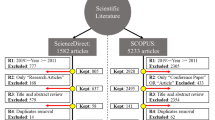Abstract
Flexibility has become one of the most important characteristics in modern manufacturing. As a result, process chains must be highly adaptable to varying demands and to new products. Furthermore, many process chains contain external processes from suppliers to handle the fluctuating process utilisation. Moreover, novel manufacturing processes that allow an even higher flexibility, such as additive manufacturing, have been introduced. In order to identify optimal parameters for flexible process chains and considering interactions between processes, a new approach for production planning is necessary. This article presents a methodology for integrative production planning in highly dynamic environments thereof. The introduced methodology is applied on two industrial use cases with the aim of identifying optimal process elements and parameters taking production costs and time under consideration. The results show that the developed methodology allows for successful modelling and optimisation of the process chain.










Similar content being viewed by others
References
Wiendahl HP, ElMaraghy HA, Zaeh MF, Wiendahl HH, Duffie N, Kolakowski M (2007) Changeable manufacturing—classification, design, operation. Ann CIRP 56:783–809. https://doi.org/10.1016/j.cirp.2007.10.003
Abele E, Elzenheimer J, Liebeck T, Meyer T (2006) Globalization and decentralization of manufacturing. In: Dashchenko AI (ed) Reconfigurable manufacturing systems. Springer, Berlin, pp 3–13
Nyhuis P, Wulf S, Klemke T, Benjamin B (2010) Integrative factory, technology, and product planning-systemizing the information transfer on the operational level. Prod Eng Res Dev 4:231–237. https://doi.org/10.1007/s11740-010-0225-6
Mehrabi MG, Ulsoy AG, Koren Y, Heytler P (2002) Trends and perspectives in flexible and reconfigurable manufacturing systems. J Intell Manuf 13:135–146. https://doi.org/10.1023/A:1014536330551
Denkena B, Mörke T (2017) Cyber-physical and gentelligent systems in manufacturing and life cycle. Academic Press, Cambridge
Hees A, Reinhart G (2015) Approach for production planning in reconfigurable manufacturing systems. Conf Intell Comput Manuf Eng 33:70–75. https://doi.org/10.1016/j.procir.2015.06.014
Denkena B, Lorenzen LE, Schmidt J (2012) Adaptive process planning. Prod Eng Res Dev 6:55–67. https://doi.org/10.1007/s11740-011-0353-7
Ponche R, Kerbrat O, Mognol P, Hascoet JY (2014) A novel methodology of design for Additive Manufacturing applied to Additive Laser Manufacturing process. Robot Comput Integr Manuf 30:389–398. https://doi.org/10.1016/j.rcim.2013.12.001
Schmidt M, Merklein M, Bourell D, Dimitrov D, Hausotte T, Wegener K, Overmeyer L, Vollertsen F, Levy GN (2017) Laser based additive manufacturing in industry and academia. Ann CIRP 66:561–583. https://doi.org/10.1016/j.cirp.2017.05.011
Newman ST, Zhu Z, Dhokia V, Shokrani A (2015) Process planning for additive and subtractive manufacturing technologies. Ann CIRP 64:467–470. https://doi.org/10.1016/j.cirp.2015.04.109
Brandes A, Apitz R, Zwick M (2002) From single steps to a comprehensive process chain. Ann DAAAM 13:63–64
Eversheim W (2002) Organisation in der Produktionstechnik 3: Arbeitsvorbereitung. Springer, Berlin
Henning H (2012) Modellbasierte Prozess-Adaption in der Feinplanung fertigungstechnischer Prozessketten. Dissertation, Universität Hannover
Eichgrün K (2003) Prozesssicherheit in fertigungstechnischen Prozessketten - Systemanalyse, ganzheitliche Gestaltung und Führung. Dissertation, Universität Kaiserslautern
Schäfer L (2003) Analyse und Gestaltung fertigungstechnischer Prozessketten - Konzept zur datenbasierten Ermittlung qualitätswirksamer Einfluss-Ursache-Wirkzusammenhänge und zur Ableitung von Maßnahmen zur Prozesssicherung. Dissertation, Universität Kaiserslautern
Mukerjee I, Ray PK (2006) A review of optimization techniques in metal cutting processes. Comput Ind Eng 50:15–34. https://doi.org/10.1016/j.cie.2005.10.001
Denkena B, Henjes J, Henning H (2011) Simulation-based dimensioning of manufacturing process chains. J Manuf Sci Technol 4:9–14. https://doi.org/10.1016/j.cirpj.2011.06.015
Hoang XL et al (2017) Modeling of interdependencies between products, processes and resources to support the evolution of mechatronic systems. IFAC PapersOnLine 50:4348–4353. https://doi.org/10.1016/j.ifacol.2017.08.873
Tönshoff HK, Denkena B, Friemuth T, Zwick M, Brandes A (2002) Technological interfaces of industrial process chains. Prod Eng Res Dev 9:43–46
Hees A, Bayerl C, Van Vuuren B, Schutte CSL, Braunreuther S, Reinhart G (2017) A production planning method to optimally exploit the potential of reconfigurable manufacturing systems. Conf Intell Comput Manuf Eng 62:181–186. https://doi.org/10.1016/j.procir.2016.06.001
Denkena B, Henjes J, Lorenzen LE (2011) Adaptive process chain optimisation of manufacturing systems. In: ElMaraghy H (ed) Enabling manufacturing competitiveness and economic sustainability: International conference on changeable, agile, reconfigurable and virtual production, vol 4. Springer, Berlin, Heidelberg, pp 184–188. https://doi.org/10.1007/978-3-642-23860-4_30
Acknowledgements
The authors thank the German Research Foundation (DFG) for its financial and organizational support of the project “Ganzheitliche Auslegung und Optimierung von Fertigungsprozessketten unter Berücksichtigung unternehmensexterner Herstellungsprozesse” (DE 447/134-1).
Author information
Authors and Affiliations
Corresponding author
Additional information
Publisher’s Note
Springer Nature remains neutral with regard to jurisdictional claims in published maps and institutional affiliations.
Rights and permissions
About this article
Cite this article
Denkena, B., Dittrich, MA. & Jacob, S. Methodology for integrative production planning in highly dynamic environments. Prod. Eng. Res. Devel. 13, 317–324 (2019). https://doi.org/10.1007/s11740-019-00889-0
Received:
Accepted:
Published:
Issue Date:
DOI: https://doi.org/10.1007/s11740-019-00889-0




